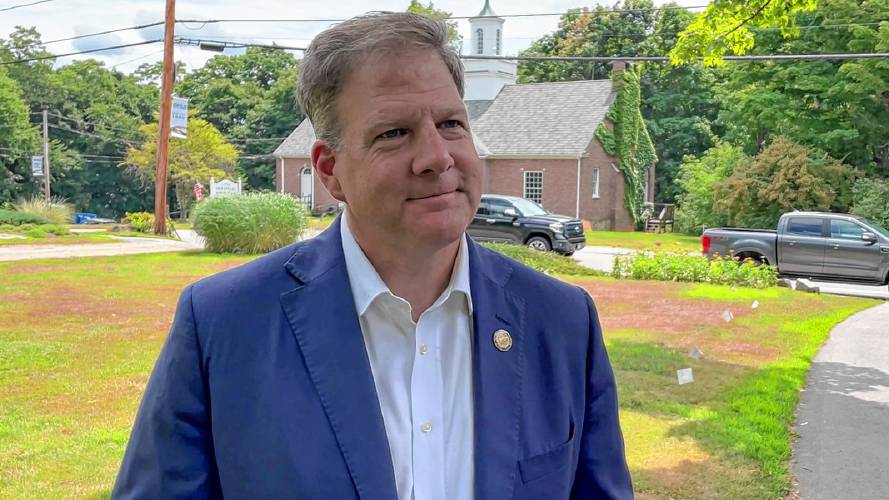Gov. Sununu signs into law trans sports ban and prohibition on gender surgeries for minors

Gov. Chris Sununu standing near the Newfields Town Hall. Paul Steinhauser
| Published: 07-19-2024 6:48 PM |
Governor Chris Sununu on Friday banned transgender girls in New Hampshire from competing on school-sponsored girls’ sports teams in the state starting in fifth grade.
The law – which makes New Hampshire the 26th state to implement transgender sports ban – was one of three bills signed on Friday that LGBTQ advocates said would diminish rights for transgender children in the state.
Another bill signed, HB 619, prohibits gender reassignment surgery for minors, while the third, HB 1312, requires teachers to notify parents at least two weeks before they teach about sexual orientation, gender, gender identity, or gender expression.
Gov. Sununu also vetoed a fourth bill, HB 396, that would have rolled back discrimination protections for transgender people with respect to locker rooms, bathrooms, prisons, jails, mental health hospitals, and treatment centers.
LGBTQ advocates had rallied for the governor to veto all four of the bills for the past two months and expressed dismay after three were signed into law.
“The bills passed by the legislature and signed by Governor Sununu today are mean-spirited attacks on our LGBTQ+ family members, friends, and neighbors that do nothing but divide communities and single out already vulnerable people for unfair treatment,” wrote GLAD attorney Chris Erchull in a joint statement with the ACLU.
Megan Tuttle, the president of the statewide teachers’ union NEA-New Hampshire, also criticized the new laws.
"Public schools should be safe, welcoming environments for all students, regardless of sexual orientation or gender identity,” Tuttle wrote. “Shame on Governor Sununu for signing into law this legislation that excludes students from athletics, which can help foster a sense of belonging that is so critical for young people to thrive.”
Article continues after...
Yesterday's Most Read Articles
 New Hampshire targets sexual exploitation and human trafficking inside massage parlors
New Hampshire targets sexual exploitation and human trafficking inside massage parlors
 New Hampshire legalizes public alcohol consumption in designated ‘social districts’
New Hampshire legalizes public alcohol consumption in designated ‘social districts’
 State rules Epsom must pay open-enrollment tuition to other school districts, despite its refraining from the program
State rules Epsom must pay open-enrollment tuition to other school districts, despite its refraining from the program
 ‘A little piece of everything I like’: New Pittsfield barbershop brings more than a haircut to downtown
‘A little piece of everything I like’: New Pittsfield barbershop brings more than a haircut to downtown
 Remembered: Friends recall stories about the lives of those who died without housing
Remembered: Friends recall stories about the lives of those who died without housing
 Town turmoil: Chichester town administrator resigns again
Town turmoil: Chichester town administrator resigns again
Sununu explained in a statement that he sought to focus on “safety and fairness” for children in his decision-making. The transgender sports ban, he said, “ensures fairness and safety in women’s sports by maintaining integrity and competitive balance in athletic competitions.” The ban on gender surgeries for minors ensures that “life altering, irreversible surgeries will not be performed on children.”
He said he vetoed the bill that would have undone discrimination protections established in 2018 because it “seeks to solve problems that have not presented themselves in New Hampshire, and in doing so invites unnecessary discord.”
The transgender sports ban – which will go into effect August 18, ahead of this fall’s school sports season – will require that all sports teams in fifth grade through 12th grade be designated as “boys,” “girls,” or “mixed” teams, and will prohibit students assigned male at birth from participating in the teams designated for girls.
The exact number of people who would be affected by the ban is unclear, but nationally, less than 0.5% of high school athletes and approximately 30 collegiate athletes are estimated to be transgender. Two transgender girls in New Hampshire and their families had publicly opposed the ban throughout the legislative session.
The parental disclosure law will broaden the topics for which teachers must notify parents about classroom content at least two weeks ahead of time. Prior to the passage of the law, they were only required to do so when teaching about human sexuality and sexual education. Opponents of the law have said it contains vague language that will have a chilling effect in the classroom.
Jeremy Margolis can be reached at jmargolis@cmonitor.com.







 NH judge decides to pause Trump’s birthright citizenship order
NH judge decides to pause Trump’s birthright citizenship order Canterbury honors ‘real heroes’ with updated Military Veterans’ Project
Canterbury honors ‘real heroes’ with updated Military Veterans’ Project Look, up in the sky! It’s… an Airstream trailer?
Look, up in the sky! It’s… an Airstream trailer?
